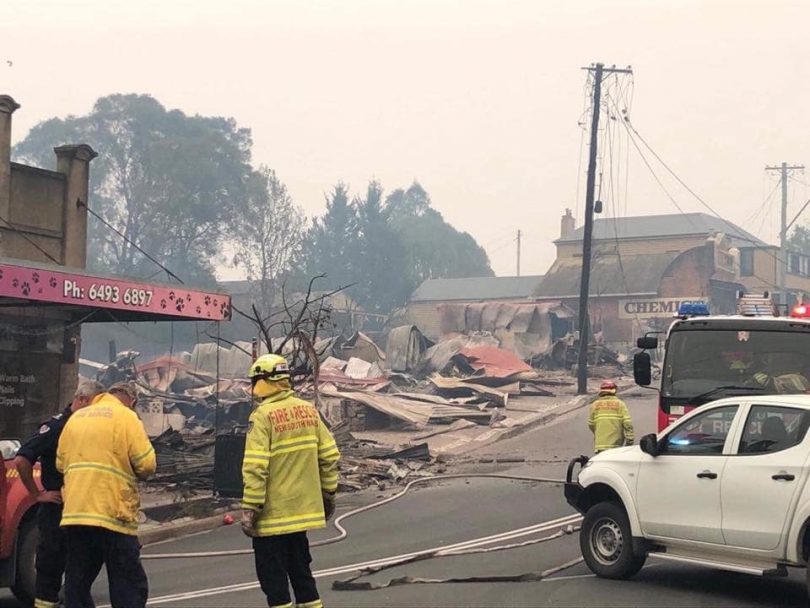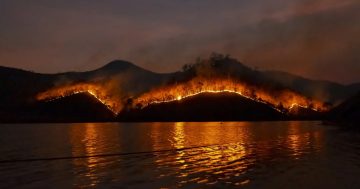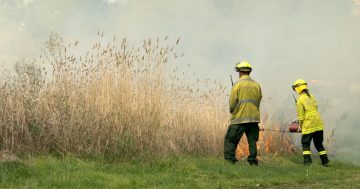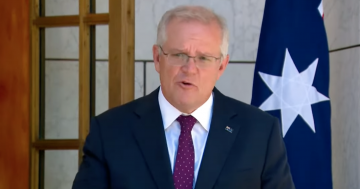
The Orroral Valley fire burnt 80 per cent of Namadgi National Park. Photo: Gary Hooker ACT RFS via ESA Twitter.
Chief Minister Andrew Barr has criticised the terms of reference of the Bushfire Royal Commission for not giving a higher priority to action on curbing climate change. He also questioned the practicality of setting a deadline of 31 August for the final report.
Mr Barr said he had written to the Prime Minister last week with feedback from the ACT on the Royal Commission’s draft terms of reference.
“It is good to see that some suggestions have been acted on; however, I note that a deadline of 31 August for this Royal Commission to hand down its final report remains highly challenging,” he said.
Mr Barr said the final terms of reference had expanded on interactions between the States and Territories and the Commonwealth relating to requests for assistance, deploying the ADF and emergency declarations.
“However, I am disappointed to see no changes to the broader question of climate change mitigation strategies,” Mr Barr said.
While acknowledging the role of climate change in the devastating season of bushfires, the Royal Commission announced today by Prime Minister Scott Morrison will focus on “practical matters” such as preparedness, adaptation and mitigation, federal-state coordination and whether the Commonwealth needs extra powers to deal with similar sorts of emergencies.
Calling the emergency the Black Summer bushfires, Mr Morrison said the Royal Commission into National Natural Disaster Arrangements will be led by former Defence Force chief Air Chief Marshal Mark Binskin (Retd), assisted by former Federal Court judge Dr Annabelle Bennett, and the ANU’s Professor Andrew Macintosh, a specialist in climate risk and impact management.
The fires killed 34 people and destroyed 3500 homes and nearly 6000 outbuildings across five states.
“The inquiry acknowledges climate change, the broader impact of our summers getting longer, drier and hotter, and is focused on practical action that has a direct link to making Australians safer,” Mr Morrison said.
“That’s why we need to look at what actions should be taken to enhance our preparedness, resilience and recovery through the actions of all levels of government and the community for the environment we are living in.”
Mr Morrison faced a barrage of criticism during the emergency for a tardy response to the bushfires that eventually saw the Defence Force and Army Reserve deployed, but the Prime Minister referred to a ”constitutional grey zone” that inhibited his government’s response.
“We need to consider the need to establish new powers for the Federal Government to declare a national state of emergency to trigger direct Federal Government responses to national disasters, including the direct deployment of the Australian Defence Force,” he said.
“Currently, there are no such powers and federal responses are supposed to only be undertaken in response to state requests and authorisations.”
Mr Morrison said the inquiry would look at three key areas:
- Improving natural disaster management coordination across all levels of government
- Improving Australia’s preparedness, resilience, and response to natural disasters, across all levels of government, and
- The legal framework for the Commonwealth’s involvement in responding to national emergencies and how that works with state and territory legal frameworks.

Fire laid waste to Cobargo on the South Coast on New Year’s Eve. Photo: Facebook.
“The overwhelming majority of the actions to protect Australians from bushfires are undertaken at a State level,” Mr Morrison said. “Everything from resourcing our fire services and hazard reduction, to land clearing and planning laws.
“Even the declaration of emergencies, the areas that are designated to receive payments and in most cases the assessment and delivery of those payments, even when they are funded by the Federal Government, are all undertaken by the states.
“I believe Australians are wanting us to look at ways we can work together to give Australians greater assurances at a national level that these important tasks are getting done.”
A key issue will be whether volunteer-based Rural Fire Services are capable of conducting such a long campaign across many states.
As well as covering hazard reduction, wildlife management and habitat protection, and planning rules, the Royal Commission will also consider the use of Indigenous burning practices to prevent or mitigate bushfires.
When it comes to federal assistance or intervention, the inquiry will look at the thresholds for and obstacles to the states and territories asking for help, and whether the Commonwealth should have the power to declare a state of national emergency and a clearer authority to take action including around the deployment of the ADF.
It will work with other inquiries announced by the states and also review the work and recommendations of previous inquiries.
The Prime Minister has written to all Premiers and Chief Ministers inviting them to establish concurrent commissions under their respective legal frameworks for Royal Commissions.
The Royal Commission is due to report no later than 31 August 2020.
















